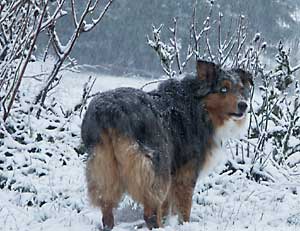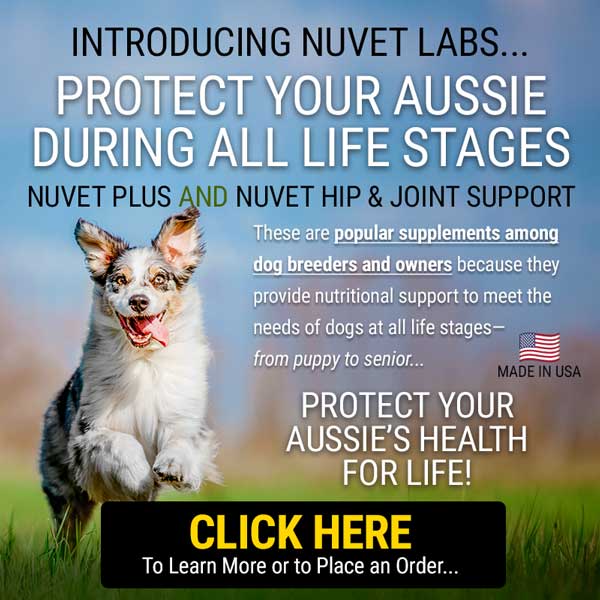
Winter Dog Safety Reminders
During the Winter and Holiday Season Please Keep These Safety Tips in Mind
We want to help keep your Aussie safe during the winter and holiday season so we've put together some dog safety tips for you.
-
Your Aussie should not be outside for more that 20 minutes in very cold weather. They are just as susceptible to sudden temperature changes as we are.
Provide shelter to give your dog safety from the elements. If your dog does stay outside for longer periods be sure she has adequate shelter. A doghouse should be raised off the ground, dry, and free of drafts. If you line the doghouse with straw, be sure to change the straw when it gets wet. Vets see far too many dogs with horrible skin rashes and respiratory problems because the dogs were forced to sleep on wet, moldy straw. -
Your Aussie can suffer from frostbite and hypothermia even early in winter. Frostbite is most common on the paws. Symptoms of frostbite may not appear until a couple of days after exposure. Watch for swollen paws and fussing over the area. Even brief exposure to sub-zero temperatures can lead to frostbite of the feet, nose or ears. Frost-bitten skin appears red, gray or whitish and may peel off. Prevent frostbite by removing ice and snow from paws and fur right away.
Dog Safety Tip: Clip the fur between toe pads to reduce the amount of snow that collects between toes.
If you suspect frostbite, take the dog to a warm place and thaw out frostbitten areas slowly by applying warm (not hot as rapid rewarming is very painful), moist towels. Change them frequently. Continue until the affected areas become flushed. Do not rub the skin to get the blood flowing back to the area as it causes friction and destroys the damaged skin and underlying tissue and increases the risk of infection. If this happens, take your dog to your veterinarian immediately. On the way, wrap your pet in dry warm blankets and apply a warm (not hot) water bottle to the affected area.
Remember, if it's too cold for you to go outside, then it's too cold for your Aussie. Think about winter dog safety when the mercury drops. -
Antifreeze tastes good to dogs, but it is a deadly poison. This is a serious threat to dog safety. Keep an eye out for antifreeze puddles. If you suspect your pet has ingested antifreeze, rush him to your veterinarian immediately as it can lead to renal failure in as little as 48 hours. The likely source of the poison is from a leaky radiator or where one was recently filled or drained usually a spot in a garage or parking area.
Ethylene glycol — the alcohol-like compound found in antifreeze and deicers — is one of the most common substances involved in accidental animal poisonings. And it's lethal. Once ingested, enzymes called alcohol dehydrogenates break down the ethylene glycol to form toxic substances that damage the kidneys. -
Also remember this season that Christmas Roses and Poinsetta's can cause a rash to the skin or mouth. Mistletoe, Ivy and Holly Berries are poisonous.
Signs that your dog may have been poisoned may include the following symptoms:-
irritation around mouth
-
drooling or discharge from mouth or nose
-
swelling around mouth or throat
-
excessive thirst
-
upset stomach or vomiting
-
stomach pain
-
diarrhea
-
urine color change
-
dilated eyes (pupils)
-
difficulty breathing
-
depression
-
weakness
-
disorientation
-
shaking
-
tremors, seizures, convulsions
-
irregular, slow or rapid heart beat
-
paralysis
-
coma
-
- When you are outside with your pet, watch out for
chemicals used to melt ice on sidewalks, as they can
irritate your pet's paws. Always wipe-off your dogs paws after
an outing making sure to remove the ice between his paw pads.
If your dog's paws look sore or irritated, you can apply a thin
coat of petroleum jelly which will help to soothe his pads.
You can also purchase commercial boots to protect his paws from
the elements.
Dog Safety Note: Pet friendly products are available to melt that ice.
- Provide extra food and water. In the winter larger rations
of quality food will provide the extra calories he needs to
stay warm. If your dog is going to spend any significant time
outside, you also must provide fresh water, which you can prevent
from freezing over by purchasing a heater for the water dish.
- Do not be tempted to let your dog off leash in snow or ice. Dogs often lose their scent in cold weather and can become lost, they can also panic in a snow storm and run away. More dogs are reported lost during the winter than any other season, so always keep your furry friend on his leash when outside the yard and make sure he's wearing proper identification. This is an especially important dog safety tip as temperatures drop.
Thinking of buying your buddy a holiday gift?

Aussie "Olivia" enjoying a crisp winter day
Some things to consider while keeping dog safety in mind:
The holidays are a time for giving and we have all see those gigantic chew bones or the red and green colored 'candy canes' made of who-knows-what that seem so tempting, however some caution is advised before shopping for your pets or your friend's pets.
As with a gift for a human, realize that each pet has their preferences (chewer, ball player, etc.) and some may have health conditions that warrant special attention when deciding on a gift.
Food allergies are common in pets. Fatty or sugary treats are not appropriate for the diabetic or overweight pet.
Whenever buying food or treat gifts for animals that are on a special diet or allergic to certain foods, remember to check the labels carefully -- even when labeled as "beef" or "chicken" there are often other fillers, such as corn or fish, two common food allergens. This can be a serious dog safety issue especially if your Aussie is severely allergic.
-
Toys that resemble common items
These may not be such a good idea as quite often they too closely resemble the items such as shoes and stuffed animals especially if you have small children and you could be unintentionally creating a problem. -
Dyes and preservatives
Pets don't care what color their toy is, the colors added to treats and chews are for our enjoyment not theirs! In addition to being a dog safety issue as these chemicals are often not healthy, the dyes may stain furniture or the carpet where your pet is enjoying the treat. -
Pets as Presents
This is the season for giving, but please take time to pause and consider very carefully before giving a pet as a gift. This is a dog safety tip because often these puppies are sent to shelters after the novelty has worn off and it is the dog that pays for this ill considered gift.
I hope these winter dog safety tips help keep your Aussie out of harms way.
Have a Safe and Happy Holiday Season!
Have Dog Training Questions?
Check out these introductory dog training videos...
I want my dog to stop being aggressive.
I want some help training my new puppy.
I want my dog to stop barking at everything.
Get Australian Shepherd Info, Website Updates, Special Offers, and Cartoons...
FREE GIFT
You'll also receive a free copy of the ebook
My Everyday Dog Training Tools
by professional dog trainer Daniel Abdelnoor, "Doggy Dan"









